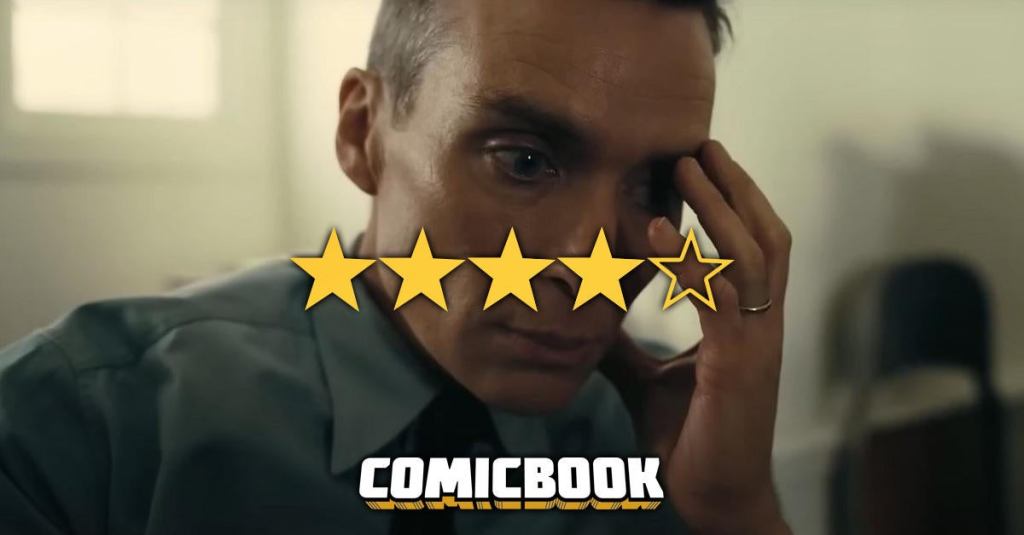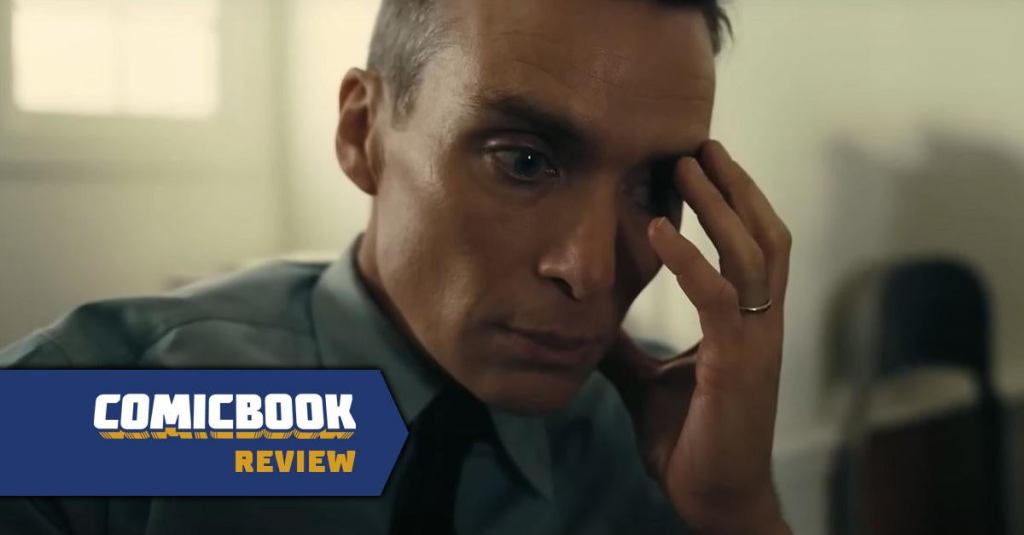On August 6th and August 9th, 1945, the United States dropped atomic bombs on the Japanese cities of Hiroshima and Nagasaki in both a display of the awesome power of the weapon and in the hopes of ending World War II in a more literal sense, as well as preventing future wars. The initial bombings are said to have killed an estimated 110,000, with another 100,000 reportedly dying due to the effects of the bombs in subsequent years. The gravity of these deaths cannot be overstated or overlooked, and with Oppenheimer, filmmaker Christopher Nolan showcases not only the power of innovation that humanity can accomplish when the greatest minds are brought together, but also how quickly other minds can betray those who carried out their wishes.
Videos by ComicBook.com
The promising mind of J. Robert Oppenheimer (Cillian Murphy) is offered the chance to pursue his interests in quantum physics, only for Leslie Groves (Matt Damon) to enlist Oppenheimer to help develop an atomic bomb, due to reports that other countries are developing a similar weapon during World War II. Oppenheimer and wife Kitty (Emily Blunt), along with his most trusted scientists, build the community of Los Alamos, whose residents are tasked with arguably the most significant and civilization-defining weapon in history. Interspersed with this journey is the chronicling of Lewis Strauss (Robert Downey Jr.), one of Oppenheimer’s former confidants, being questioned in his pursuit to become a member of Dwight D. Eisenhower’s presidential cabinet, unraveling the details of his falling out with Oppenheimer.
Whether it be murder mysteries like Memento and Insomnia, his work in the superhero genre with three Batman films, or his more ambitious experiments like Inception and Tenet, there are few contemporary directors who can captivate an audience like Christopher Nolan. No matter what the subject matter might be, the scripts he brings to life, the pacing of his cuts, and the intensity of his performers make for experiences that you can’t look away from. Even though many audiences might know J. Robert Oppenheimer for his connection to the atomic bomb (which the explosion-filled marketing campaigns continue to remind us about), the actual experience of the film is hardly concerned with such a monumental development. Most viewers likely know how the calculations and experimentations will pan out, with Nolan — who also scripted the picture, based on Kai Bird’s book American Prometheus — instead focusing on the literal and figurative interrogations and accusations that Oppenheimer was subjected to, just out of his civic duty.
The first two acts showcase the humanity of Oppenheimer, thanks in large part to the compelling nature of Cillian Murphy’s performance. The actor is often one of the highlights of any project he takes part in, and while he could easily deliver all manner of acting tropes as he carries the story, both his and Nolan’s restraint paint a much more nuanced picture of a man who knows he has gifts that others would trade anything for. Oppenheimer would much rather toil away in the world of quantum physics, but knowing that he understands the science better than anyone else means that he’s obligated, both to his country and to humanity itself, to be the one to harness the power of the atomic bomb. Despite this devotion, he’s still a conflicted man, as he dabbles with members of the American Communist Party and has a complicated romantic relationship with Jean Tatlock, played by the always-charming Florence Pugh. Whatever it was that inspired it, Oppenheimer became a martyr who carried that title with him as far as he had to.
The last act of the film fully embraces that martyrdom, trading in the awe-inspiring development of a world-changing weapon for the bureaucracy of what happens when you don’t fall in line with the rest of the company. In his first major post-Marvel role, Robert Downey Jr. showcases everything that made him a star for multiple decades. He’s cold, calculating, charming, and coercive. Audiences are left guessing whether he is a supporter of Oppenheimer who is being dragged down for those allegiances or if he’s pulling strings to benefit from a fallen comrade’s downfall. With an ensemble cast featuring the talents of Matt Damon, Josh Hartnett, Kenneth Branagh, Benny Safdie, David Krumholtz, Jack Quaid, and David Dastmalchian, just to name a fraction of the film’s stars, everyone gets the chance to do some capital-A Acting. Given the nature of the storyline, Emily Blunt and Florence Pugh take a backseat to virtually every male star, but they make their presences known at every opportunity.
Nolan uses this impressively talented cavalcade of stars to explore the human condition and the doors that can either be opened or shut, based on your heritage, political affiliations, gender, or socioeconomic status. Keeping more in line with these internalized themes is his visual approach to Oppenheimer, which is a far cry from the spectacles he’s delivered in previous outings. While a film like Dunkirk was based on true events, it was still an experience that delivered bombast akin to other war epics. Oppenheimer trades the shock and awe for a micro scale, delivering visuals that are abstract depictions of what happens at atomic levels in both humans and in weapons of mass destruction. The inherent nature of the premise and its real-life ramifications also means that the audience is unsettled by the looming threat of explosive tests, knowing the human toll these sequences might take. While viewers may have hooted and hollered at last year’s Top Gun: Maverick for its dogfights and militaristic spectacle, Oppenheimer braces audiences for a bomb going off, as it represents not only hundreds of thousands of deaths, but also the advancement of thermonuclear war in perpetuity.
Dating back to 2008’s The Dark Knight, Christopher Nolan has embraced IMAX cameras to immerse audiences in the tension of pulse-pounding sequences, but with Oppenheimer, the most harrowing moments are when Cillian Murphy conveys the internal trauma he grapples with. Not only does he have to cope with romantic trysts and the questioning of loyalties to his country, but also the oppressive nature of the curse he’s bringing into the world. While one minute he might be hoisted upon shoulders and applauded for a job well done, the next minute will see him grappling with being fortunate enough to have developed the bomb instead of being one of its thousands of victims. The cast and crew of Oppenheimer have made note that the film often feels like a horror movie at times, with those emotional horrors being far more explosive and disquieting than any image related to a bomb going off. Those visuals are only heightened by the sound design, as the audience experiences a similarly oppressive assault on the senses as what the characters endure.
Another tool in Nolan’s toolbox is the juxtaposition between color and black-and-white photography, which helps differentiate between Oppenheimer‘s perspective and then those outside of his own point of view. Longtime Nolan fans will remember this formula from his Memento, with both films using this technique in a more practical sense for the movie’s overall structure as opposed to an ambitious aesthetic experiment. It’s also worth noting that, with a run time of three hours, it marks Nolan’s longest film yet, and while there are surely lulls, the pacing is overall effective, as a majority of the experience is jumping from one scene of talented performers to the next.
Between his The Dark Knight trilogy, Inception, Dunkirk, and to some extent Tenet, Nolan has a penchant for delivering massive experiences in the summer months, with Oppenheimer earning the expectation of following suit, whether it wants to earn that stigma or not. The film is, instead, the anti-summer spectacle, not only because of its emphasis on internalized conflicts but also due to its downright depressing and disturbing subject matter. Even if a movie like Dunkirk similarly depicted real-life horrors of war, there’s some escapism in how Nolan stages a scene and depicts those atrocities. Oppenheimer might feature one of Nolan’s best casts, but it’s also the least audience-friendly narrative. A case could be made that it is Nolan’s most important film, not only because of its overall messages about disregard for human casualties, governmental manipulation, and bureaucratic betrayal, but also because it’s ultimately a cautionary tale about the relentless ravages of war. Despite its importance, it’s hard to say there’s much about the film that’s necessarily entertaining in a more surface-level sense, which is sure to alienate both casual moviegoers and Nolan fanatics alike.
After a long string of crowd-pleasers that also manage to inject ambitious philosophical and existential components, Oppenheimer is Christopher Nolan’s most intellectual and internal experience in years. It showcases the universality of humanistic struggles without hingeing upon them entirely, while also subtly yet exponentially layering in explicit critiques of global war machines. Despite chronicling events that unfolded 70 years ago, exploring an arms race or being given conflicting information by government authorities and being expected to honor ever-changing ideologies feels immensely contemporary. With Oppenheimer, Nolan orchestrates a talented symphony of performers at the top of their game to explore an overlooked corner of history, treating it with nuance and respect while lesser hands would lean into melodrama. The movie is a tribute not only to the true-life figures who pushed the limits of science forward, but also to those who suffered the consequences of those forward-thinkers’ quest for fire.
Rating: 4 out of 5

Oppenheimer lands in theaters on July 21st.









